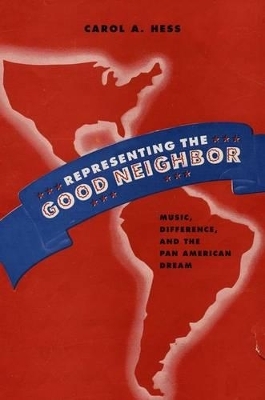
Representing the Good Neighbor
Oxford University Press Inc (Verlag)
978-0-19-991999-4 (ISBN)
In Representing the Good Neighbor, Carol A. Hess investigates the reception of Latin American art music in the US during the Pan American movement of the 1930s and 40s. An amalgamation of economic, political and cultural objectives, Pan Americanism was premised on the idea that the Americas were bound by geography, common interests, and a shared history, and stressed the psychological and spiritual bonds between the North and South. Threatened by European Fascism, the US government wholeheartedly embraced this movement as a way of recruiting Latin American countries as political partners. In a concerted effort to promote a sameness-embracing attitude between the US and Latin America, it established, in collaboration with entities such as the Pan American Union, exchange programs for US and Latin American composers as well as a series of contests, music education projects, and concerts dedicated to Latin American music.
Through comparisons of the work of three of the most prominent Latin American composers of the period - Carlos Chávez, Heitor Villa-Lobos and Alberto Ginastera - Hess shows that the resulting explosion of Latin American music in the US during the 30s and 40s was accompanied by a widespread - though by no means universal - embracement by critics as an exemplar of cosmopolitan universalism. Aspects shared between the music of US composers and that of their neighbors to the south were often touted and applauded. Yet, by the end of the Cold War period, critics had reverted to viewing Latin American music through the lens of difference and exoticism. In comparing these radically different modes of reception, Hess uncovers how and why attitudes towards Latin American music shifted so dramatically during the middle of the twentieth century, and what this tells us about the ways in which the history of American music has been written. As the first book to examine in detail the critical reception of Latin American music in the United States, Representing the Good Neighbor promises to be a landmark in the field of American music studies, and will be essential reading for students and scholars of music in the US and Latin America during the twentieth-century. It will also appeal to historians studying US-Latin America relations, as well as general readers interested in the history of American music.
Carol A. Hess is Professor of Musicology at Michigan State University. She is author of Manuel de Falla and Modernism in Spain, 1898-1936 (Chicago, 2001, winner of an ASCAP-Deems Taylor Award and the Robert M. Stevenson prize for outstanding scholarship in Iberian music) and Sacred Passions: The Life and Music of Manuel de Falla (Oxford 2004).
CONTENTS ; Acknowledgements ; Editorial matters ; List of musical examples ; List of figures ; Chapter One. Introduction ; I. Difference and History in the Americas ; II. The Narrative ; Chapter Two: The Roots of Pan Americanism ; I. Historical Premises ; II. Pan Americanism and Music: An Overview ; Chapter Three: Carlos Chavez and Ur-Classicism ; II. Absolute Mexican Music: "True Classicism" and Universalism in the Americas ; Chapter Four: Carlos Chavez's H.P.: Dialectical Indigenism, Mestizaje, and the Politics of Sameness ; I. To "Suggest Objectively the Life of All America": Chavez and Dialectical Indigenism. ; II. "Find Me a Primitive Man": Premiere and Reception ; Chapter Five: Brazilian Modernism and the Making of "American Rhythm": Villa-Lobos at the 1939 World's Fair ; I. From "Hallucinated City" To Democracity: Villa-Lobos, the Many Faces of Brazilian Modernism, and the Good Neighbor ; II. Caliban Unbound: Villa-Lobos and Unsublimated Primitivism ; Chapter Six: The Golden Age: Pan Americanist Culture, War, and the Triumph of Universalism ; I. Pan Americanist Culture and Music in the United States ; II. Folklore Cults and the "League of Minor Musical Nations" ; III. Nationalism: The "Greatest Foe" ; IV. "The Brazilian Oklahoma! and the Memory of Universalism ; Chapter Seven: Alberto Ginastera's Bomarzo: Sublimation and the Annihilation of Difference ; I. Ginastera in the United States: Becoming a "Musical McNamara" ; II. Bomarzo: Sublimation and the "Strength of the Repressed Urge" ; III. Censorship and the Limits of Aleatory ; Chapter Eight: Memory, Music, and the Latin American Cold War: Frederic Rzewksi's Variations on 'The People United Will Never Be Defeated! ; I. Nueva Cancion, Musica Nacional, and the Cold War ; II. "The People United Will Never Be Defeated!" and the Rhetoric of Memory ; Chapter Nine: Epilogue. Utopia and Pan Americanism's Legacy ; Bibliography
| Reihe/Serie | Currents in Latin American and Iberian Music |
|---|---|
| Zusatzinfo | 24 halftones, 11 music examples |
| Verlagsort | New York |
| Sprache | englisch |
| Maße | 236 x 160 mm |
| Gewicht | 612 g |
| Themenwelt | Kunst / Musik / Theater ► Musik ► Klassik / Oper / Musical |
| Kunst / Musik / Theater ► Musik ► Musiktheorie / Musiklehre | |
| Kunst / Musik / Theater ► Musik ► Pop / Rock | |
| Geisteswissenschaften ► Geschichte ► Regional- / Ländergeschichte | |
| Sozialwissenschaften ► Soziologie | |
| ISBN-10 | 0-19-991999-2 / 0199919992 |
| ISBN-13 | 978-0-19-991999-4 / 9780199919994 |
| Zustand | Neuware |
| Haben Sie eine Frage zum Produkt? |
aus dem Bereich


